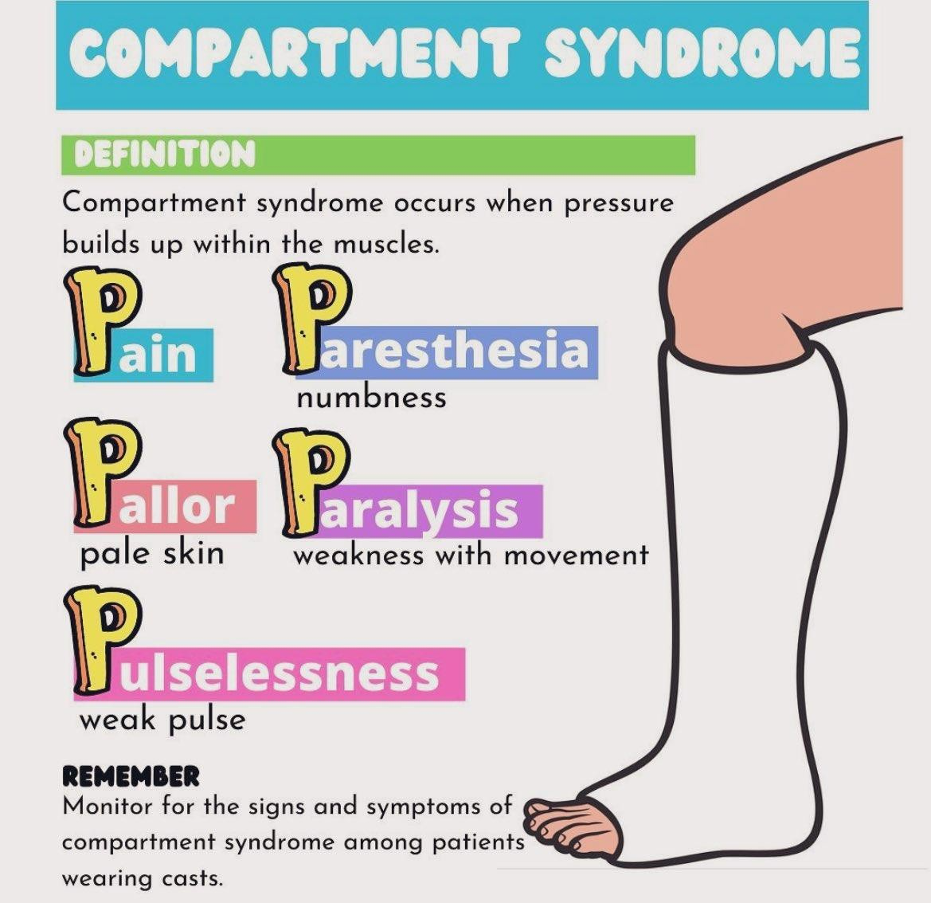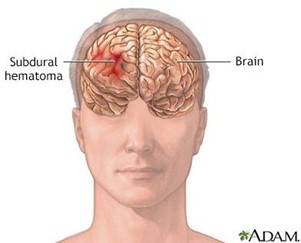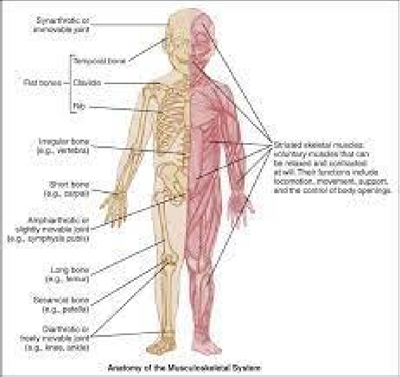A boy who has fractured his forearm is unable to extend his fingers. The nurse knows that this
may indicate damage to the epiphyseal plate.
is normal following this type of injury.
may indicate compartment syndrome.
may indicate fat embolism.
The Correct Answer is C
Compartment syndrome is a condition that can occur following an injury, such as a fracture, where there is increased pressure within a closed space (compartment) in the body. In the case of a forearm fracture, swelling and increased pressure within the compartment can lead to compression of the nerves and blood vessels, resulting in symptoms such as pain, numbness, and decreased function of the affected muscles.
The inability to extend the fingers suggests impairment of the extensor muscles, which are innervated by the radial nerve. If the radial nerve is compressed or injured due to compartment syndrome, it can result in a loss of function in the muscles it innervates, leading to the inability to extend the fingers.
damage to the epiphyseal plate in (option A) is incorrect because it, is not related to the inability to extend the fingers. The epiphyseal plate is the growth plate in long bones, and damage to it would typically affect bone growth rather than finger extension.
, stating that it is normal following this type of injury in (option B), is incorrect. Inability to extend the fingers is not a normal or expected finding after a forearm fracture. It suggests a potential complication or underlying issue.
fat embolism in (option D) is incorrect because it, is unlikely to cause an inability to extend the fingers. Fat embolism occurs when fat globules from a broken bone enter the bloodstream and can lead to respiratory and neurological symptoms, but it would not specifically cause an isolated loss of finger extension.

Nursing Test Bank
Naxlex Comprehensive Predictor Exams
Related Questions
Correct Answer is A
Explanation
A subdural hematoma is a type of intracranial bleeding that occurs between the dura mater (the
outermost layer of the meninges) and the skull. The dura mater is a tough membrane that covers
and protects the brain. When a subdural hematoma occurs, blood collects between the dura mater
and the skull, resulting in increased pressure on the brain.
Bleeding is generally arterial, and brain compression occurs rapidly in (Option B) is incorrect because
while bleeding in a subdural hematoma can be arterial, it can also be venous. The rate of bleeding
and brain compression can vary depending on the size and severity of the hematoma.
Bleeding occurs between the dura and the cerebrum in (Option C) is incorrect because the bleeding
in a subdural hematoma does not occur between the dura and the cerebrum (the largest part of the
brain). It specifically occurs between the dura and the skull.
The hematoma commonly occurs in the pretemporal region in (Option D) is incorrect because the
location of a subdural hematoma can vary. While pretemporal region is a possible location, subdural
hematomas can occur in different areas of the brain, depending on the site of injury.

Correct Answer is C
Explanation
Infants and children have open growth plates, also known as epiphyseal plates, at the ends of
their long bones. These plates are responsible for bone growth and are not fully fused until
the child reach skeletal maturity. Due to the presence of open growth plates, infants and
children are more prone to fractures because their bones are still developing and are less
dense than those of adults.
Their bones have less blood flow in (Option A) is incorrect because cchildren’s bones
actually have a greater blood flow compared to adults. This increased blood flow supports the
rapid growth and development of bones in children.
Growth occurs in children as a result of an increase in the number of muscle fibers in (option
B) is incorrect because ggrowth in children occurs primarily due to the elongation and
thickening of existing muscle fibres, not an increase in their number. This option inaccurately
suggests that children's muscles increase in fibber count to facilitate growth.
Because soft tissues are resilient in children, dislocations and spirals are less common than in
adults in (Option D is) incorrect. While soft tissues may be more resilient in children, it does
not mean that dislocations and sprains are less common than in adults. In fact, children's
ligaments and joint structures are still developing and may be more susceptible to injuries
such as sprains and dislocations compared to adults.

Whether you are a student looking to ace your exams or a practicing nurse seeking to enhance your expertise , our nursing education contents will empower you with the confidence and competence to make a difference in the lives of patients and become a respected leader in the healthcare field.
Visit Naxlex, invest in your future and unlock endless possibilities with our unparalleled nursing education contents today
Report Wrong Answer on the Current Question
Do you disagree with the answer? If yes, what is your expected answer? Explain.
Kindly be descriptive with the issue you are facing.
